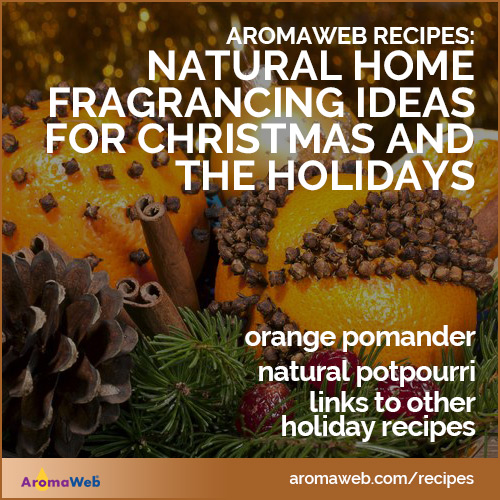Natural Home Fragrancing Ideas for Christmas and the Holidays
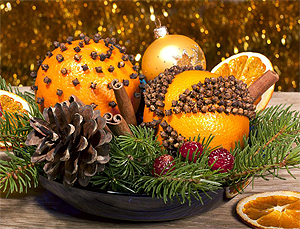
Shown in the photograph are orange pomanders (recipe below) surrounded by naturally fragrant needles, cinnamon sticks and spices. Use this photo as inspiration for your own aromatic centerpiece or display.
Christmas time is full of the colorful sites of Christmas decorations and beautiful decorated gifts, the sounds of laughter and loved ones, the taste of holiday treats, and the many aromas of this special time of year.
When I think of the holidays, I think of beautiful outdoor scenes, falling snow, baking cookies and delicious meals and the natural aroma of Christmas trees, pine needles, sprigs of rosemary, frankincense, the nutmeg in eggnog, and so on. The last thing I want to associate with Christmas is synthetic chemicals... but as each year passes, I see more and more synthetic home fragrancing products on the market in a myriad of "holiday" aromas. Holiday candles is an especially growing market over the past few years. Most candles are made with paraffin wax (a byproduct of petroleum production) that emit toxins into the air when burned. And most candles are fragranced with synthetic fragrance oils. It's no wonder that so many people develop allergies and headaches from fragranced candles and other synthetic room fragrance products. (For information about natural candles, see AromaWeb's Aromatherapy Candles article.)
Fragrancing our homes naturally is easy, better for our health, can be more affordable than buying synthetic commercial fragrancing products, and gives you more control over customizing the fragrance to your family's preferences.
Look to the Seasonal section of AromaWeb's Recipe Box for these recipes:
- Christmas Tree Diffuser Blend
- Sugar & Spice Diffuser and Potpourri Blend
- Frankincense & Fir Diffuser Blend
- Frankincense & Myrrh Diffuser Blend
- Scented Greeting Cards & Tissue Paper
Orange Pomander
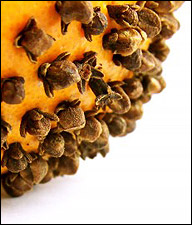
For a natural and visually interesting aromatic holiday tabletop decoration, create an orange pomander.
Quick Method
The quickest way to make and enjoy an orange pomander is to firmly press whole cloves into a fresh orange. However, "fresh" pomanders only last a brief period. They do not last anywhere near as long as pomanders that are cured in a "bath" of spices for several months. Such pomanders can then last for years and years if kept dry.
Curing Method
To cure a pomander, first combine ground cinnamon, clove, ginger, allspice and nutmeg in a measuring cup, filling it half way (approximately 4 ounces). Then, add the ground spices to a bowl, mix them, and add the pomander (after having first inserted the cloves). Coat the pomander completely. Re-coat the pomander daily. You will notice that the pomander gradually begins to feel lighter. After 1-2 months when it feels very light, it will be cured. Your climate, home temperature/humidity and how often you re-coat your pomander will affect how long it takes for the pomander to cure. Once it is cured, you can remove it from the spice bath and include it in a decorative arrangement.
Natural Potpourri
AromaWeb's Potpourri Recipe can also be adapted to create a wonderfully aromatic and beautiful seasonal potpourri. Consider creating holiday potpourri that includes whole nutmeg, cloves, dried apple slices, cinnamon sticks and perhaps dried rosemary sprigs for visual appeal.
General Safety Information
These recipes are offered for educational purposes only. Before using any essential oil, carefully read AromaWeb's Essential Oil Safety Information page. For in-depth information on oil safety issues, read Essential Oil Safety by Robert Tisserand and Rodney Young. Do not take any oils internally and do not apply undiluted essential oils, absolutes, CO2s or other concentrated essences onto the skin without advanced essential oil knowledge or consultation from a qualified aromatherapy practitioner. For general dilution information, read AromaWeb's Guide to Diluting Essential Oils. If you are pregnant, epileptic, have liver damage, have cancer, or have any other medical problem, use oils only under the proper guidance of a qualified aromatherapy practitioner. Use extreme caution when using oils with children and consult a qualified aromatherapy practitioner before using oils with children, the elderly, if you have medical issues or are taking medications.
Do You Need the Ingredients Listed in This Recipe?
You can find the essential oils, other ingredients and packaging that you need by patronizing the fine companies that support AromaWeb with their banner advertising located throughout AromaWeb (See them all at a glance within the Advertiser Spotlight area) and the listings located within the Aromatherapy Business Directory. Many of AromaWeb's advertisers also expertly formulate their own ready-made products if you decide you'd rather not make aromatherapy products yourself.
Do You Want More Essential Oil Recipes and Blends?
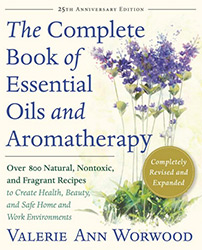
Over 800 Recipes!
The Complete Book Of Essential Oils & Aromatherapy
Author: Valerie Ann Worwood
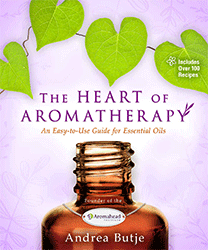
Over 100 Recipes!
The Heart of Aromatherapy
Author: Andrea Butje
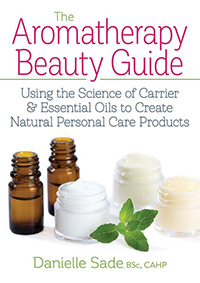
100 Recipes!
The Aromatherapy Beauty Guide
Using the Science of Carrier & Essential Oils to Create Natural Personal Care Products
Author: Danielle Sade, BSc, CAHP
Visit AromaWeb's Books area to find details about many other essential oil and aromatherapy books.
